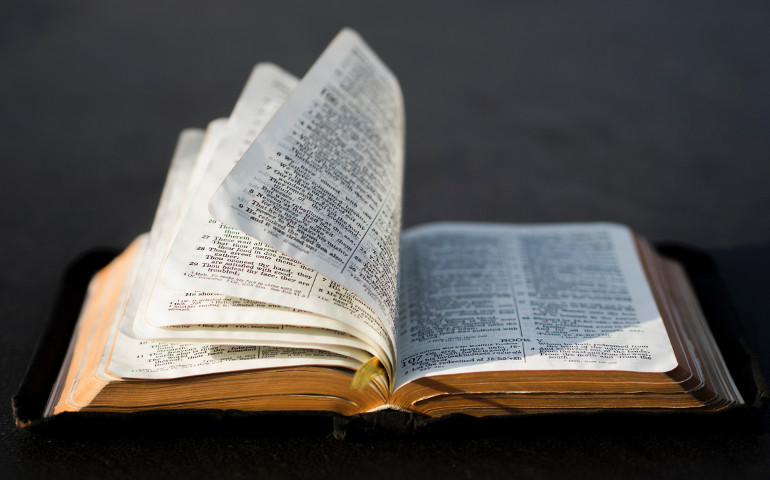
Unsplash/Aaron Burden
Poor Jeremiah, born into a family of priests and called to be a prophet. When Jeremiah heard God say that he had been called for this from the womb, it was like being told that his birth certificate named him “Renegade-for-life.” Nothing was ever going to be easy for this man.
What is a prophet? A prophet is someone called by God to read the signs of the times in the light of the Gospel. A prophet is someone deeply in touch with contemporary reality, one who is loving and courageous enough to expose what is contrary to the will of God as well as galvanize others to believe in and work to create a Gospel alternative. Now that’s a job description set up to antagonize just about everybody.
All those who benefit from the status quo — authorities, clergy, the dominant race, the highly educated, the wealthy, etc. — know that prophets question such people’s privilege, privilege that they generally believe they have earned. The privileged among us recognize prophetic words as a threat to our complacency.
| Twelfth Sunday in Ordinary Time |
| Jeremiah 20:10-13 Psalm 69 Romans 5:12-15 Matthew 10:26-33 |
Do we wonder why people rejected and plotted against Jeremiah? The prophetic message is just too demanding! Jeremiah’s case presents what could almost be a cartoon caricature. When a scroll of Jeremiah’s prophecy was presented to the king, the king listened to it section by section, and as each segment came to an end he borrowed a knife, cut off the part just read and threw it into the fire (Jeremiah 36). Of course, it didn’t take long for even Jeremiah’s friends to understand that their relationship with him might not be worth the price.
If you’re not sure about the cost of listening to prophecy, look up quotes from Pope Francis available on the U.S. bishops’ website, www.usccb.org. Listen to Francis quoting St. John Chrysostom: “Not to share one’s goods with the poor is to rob them and to deprive them of life. It is not our goods that we possess, but theirs.” That’s a prophetic statement that lets nobody with two coats off the hook. It says that when you encounter the poor, you either robe them or you rob them.
The second dimension of prophecy is the too-often-forgotten task of promoting real alternatives. This dimension of the prophetic vocation offers an interpretation of the charge Jesus gives us in today’s Gospel: “What I say to you in the darkness, speak in the light.”

How often do we hear a nearly inaudible voice prod us with some version of those most disturbing questions: “Isn’t there another possibility? Does it always have to be this way?” These are quite often the questions of young people whose experience has not yet taught them to capitulate to “the way things really work” and who have not yet accumulated so much that they feel they must protect it. The moment we find ourselves resisting such questions, we need to ask ourselves what we fear, what have we allowed to come into our lives and fetter our hopes?
More importantly, we need to ask ourselves what we honestly believe about “the way things really work.” That’s Paul’s subject in today’s selection from Romans. He begins by talking about “the way it is” — sin and death seem to rule our world. Then he challenges his people to ask themselves if they believe that Christ has really made a difference. Paul admits that the contagion of evil has infected everyone, but he asserts that the grace of God, the gracious gift of Jesus Christ, has more than overcome the way of the world.
In today’s Gospel, Jesus sends the apostles out to preach the coming of the kingdom of heaven in word and deed. He knows they will encounter resistance and even life-threatening opposition. Thus, he starts and finishes the core of his instructions by saying, “Do not be afraid.”
Halfway in between those two statements, he explains that those who kill the body have very limited power; the real danger comes from those who can suffocate the human spirit. The latter are the ones the prophets rail against, even at the cost of their lives.
Today’s readings call us to reconsider our Christian vocation. Each of us was baptized to share in Christ’s prophetic ministry. That means we need to stop and ask ourselves if we are willing to step into the space where the way of the world contradicts the Gospel and say, “It doesn’t have to be this way.” It means we must love our world enough to be part of making it what God created it to be.
Accepting the call to prophecy means that, like Jeremiah, we are accepting the role of speaking and acting as renegades for life.
[Mary M. McGlone, a Sister of St. Joseph of Carondelet, is currently writing the history of the Sisters of St. Joseph in the U.S.]




